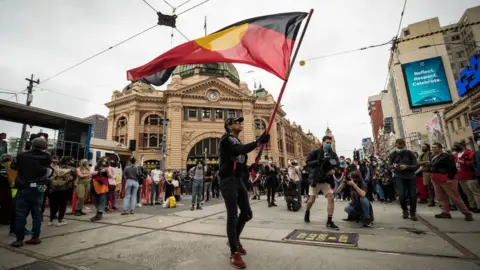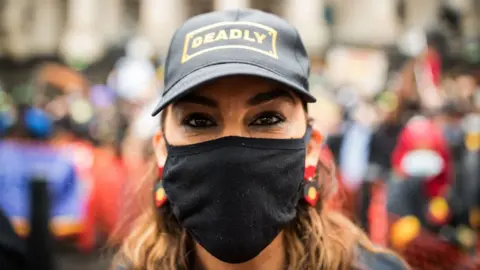Aboriginal Australians: Victoria to hold inquiry into impact of colonisation
 Getty Images
Getty ImagesThe Australian state of Victoria has announced an inquiry into the impact of colonisation on Aboriginal people - the first probe of its kind nationally.
Aboriginal Australians were dispossessed of their land after British settlement in 1788 and have since endured systemic injustices.
Unlike some other Commonwealth nations, Australia has never formally examined the full impact of past policies.
The state government said a proper examination was long overdue.
"Today has been owed for 233 years," it said in a joint statement with indigenous leaders on Tuesday.
"233 years of violence, dispossession and deprivation. 233 years of deliberate silence. Today we commit to telling the truth."
Called the Yoo-rrook [Truth] Justice Commission, the inquiry will be modelled on one established by Nelson Mandela in post-apartheid South Africa, and others that have taken place in Canada and New Zealand, local media reported.
It will begin later this year and have the powers of a royal commission - Australia's highest form of public inquiry - meaning it can compel witnesses to appear before public hearings. Findings are expected next year.
In announcing the inquiry, the government referred to past injustices including massacres of indigenous people by white settlers, and the state-sanctioned removal of children from their families last century - a group now known as the Stolen Generations.
Those policies were still being felt today, said the government.
The inquiry would also look at "ongoing injustices" against indigenous Victorians "across all areas of social, political, cultural and economic life", it added.
Indigenous representatives have welcomed the opportunity for "truth telling".
 Getty Images
Getty Images"When the colonisers invaded, there was a war on these lands - a war that hasn't ended. But we won't achieve peace without truth," said Lidia Thorpe, a Victorian senator in the federal parliament.
Victoria taking biggest steps
Of Australia's states, Victoria has taken the greatest strides in recent times to reckon with its past. The state has also begun negotiations on treaties with its indigenous people.
The Australian government has drawn criticism for rejecting a landmark proposal - the "Uluru Statement from the Heart" from indigenous leaders in 2017.
It has pledged to establish some form of a "Voice to Parliament" - an indigenous advisory group - but rejected calls to enshrine it in Australia's constitution.
The government has also committed to reducing inequality for indigenous Australians, who face disproportionately low life expectancy, employment and literacy rates.
Aboriginal and Torres Strait Islander people make up about 3% of the population.

